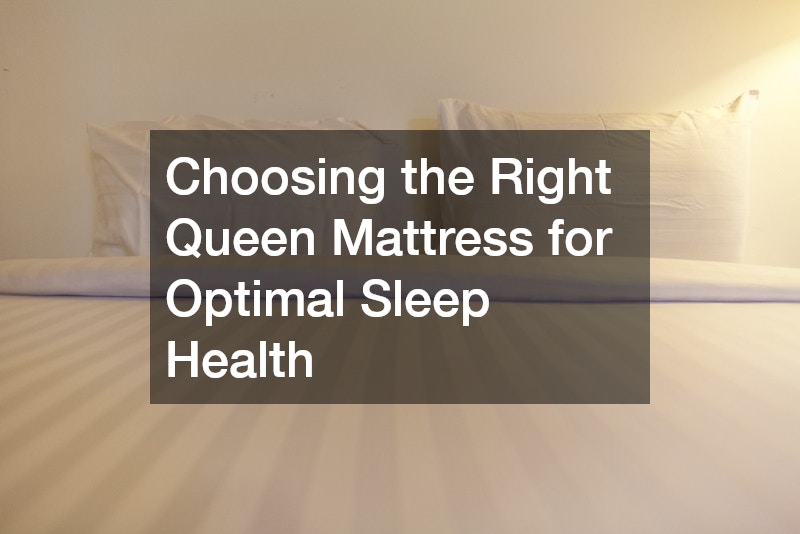Sleep health is paramount in maintaining overall well-being. A significant factor contributing to quality sleep is the mattress you choose. The right queen mattress not only supports restful nights but also impacts your daily life.
Getting a good night’s sleep is essential for maintaining overall health and well-being, and the right mattress plays a major role in achieving that goal. For many sleepers, a queen mattress offers the perfect balance of comfort, space, and support, making it one of the most popular choices for couples and individuals alike.
However, not all queen mattresses are created equal—factors such as firmness, material type, temperature regulation, and body support can significantly affect sleep quality. Choosing the right queen mattress involves understanding your personal sleep habits, body needs, and preferences to ensure restful, uninterrupted sleep. By investing in a mattress that properly supports your spine and promotes comfort, you can improve not only your sleep but also your long-term physical and mental health.
Understanding Mattress Types
Selecting the right type of queen mattress is a crucial step towards achieving optimal sleep health. There are several mattress types to consider, including innerspring, memory foam, latex, and hybrid mattresses. Each type has unique properties that cater to different sleep preferences and needs.
Innerspring mattresses are traditional and popular for their support and breathability. Memory foam mattresses adapt to your body shape, providing a personalized sleeping experience. Latex mattresses offer firmness and responsiveness, while hybrid options combine different materials for a balanced feel.
Understanding the pros and cons of each mattress type will help you make an informed decision. Consider factors like durability, maintenance, and potential allergens associated with materials. Ultimately, the choice of mattress type should align with your individual comfort and support needs.
Choosing a Firmness Level
Firmness level significantly impacts your overall sleep experience and health. Factors affecting firmness preference include body weight, sleeping position, and personal comfort. Understanding these factors can guide you in selecting a mattress that supports your specific needs.
Those who sleep on their back may prefer a medium-firm mattress that offers support while maintaining spinal alignment. Side sleepers often benefit from softer bedding that cushions shoulders and hips. Stomach sleepers may require a firmer surface to prevent sagging and align their body properly.
It’s essential to test different firmness levels during your search for the perfect queen mattress. Many retailers offer trial periods, allowing you to experience how the mattress feels over several nights. This experimentation can significantly enhance your chances of selecting the ideal firmness for better sleep health.
Considering Size and Weight
The size and weight of your mattress can impact its overall usability and compatibility with your bed frame. A queen mattress typically measures 60 inches wide by 80 inches long, suitable for couples or individuals who enjoy extra space. It is important to ensure that your bed frame can accommodate this size for optimal support.
When considering weight, keep in mind how often you plan to move or adjust the mattress. Heavier mattresses may be more challenging to maneuver, especially during cleaning or relocation. Additionally, the weight of the mattress can affect how well it fits and stays on your bed frame or platform.
Furthermore, a mattress’s weight can influence the longevity and durability of your bed frame. When purchasing a queen mattress, consider both the dimensions and weight to avoid future issues with compatibility. Thorough research will ensure you make a wise investment in your sleep health journey.
Understanding the Benefits
The right queen mattress can confer several health benefits that may improve your quality of life. A supportive and comfortable mattress contributes to better posture during sleep, lowering the risk of back pain. Selecting a mattress that meets your body’s needs can significantly impact your overall sleep quality.
Quality sleep is essential for maintaining physical and mental health, as it affects mood, energy levels, and cognitive function. A mattress that alleviates pressure points can help prevent nighttime discomfort, allowing for uninterrupted sleep cycles. This, in turn, can enhance overall productivity and well-being during waking hours.
Additionally, the right queen mattress can contribute to improved breathing during sleep, reducing the risk of sleep apnea symptoms. A mattress with proper firmness and support ensures your spine remains properly aligned and reduces the risk of waking up stiff. Knowing how your mattress affects your health can empower you to prioritize your sleep more effectively.
Choosing the right queen mattress is vital for supporting your sleep health. From understanding mattress types and firmness levels to considering size, weight, and budget, several factors are at play. By making an informed decision, you can enhance your sleep quality, ultimately leading to improved health and well-being.
Selecting the right queen mattress is more than just a matter of comfort—it’s a key decision that directly impacts your sleep health and daily well-being. The ideal mattress should support your body’s natural alignment, minimize pressure points, and provide the right level of firmness to suit your sleep style. With careful consideration of materials, construction, and personal preferences, you can find a mattress that enhances both the quality and duration of your rest. Ultimately, the right queen mattress can transform your nights and energize your days, helping you wake up refreshed, pain-free, and ready to take on life’s challenges.


